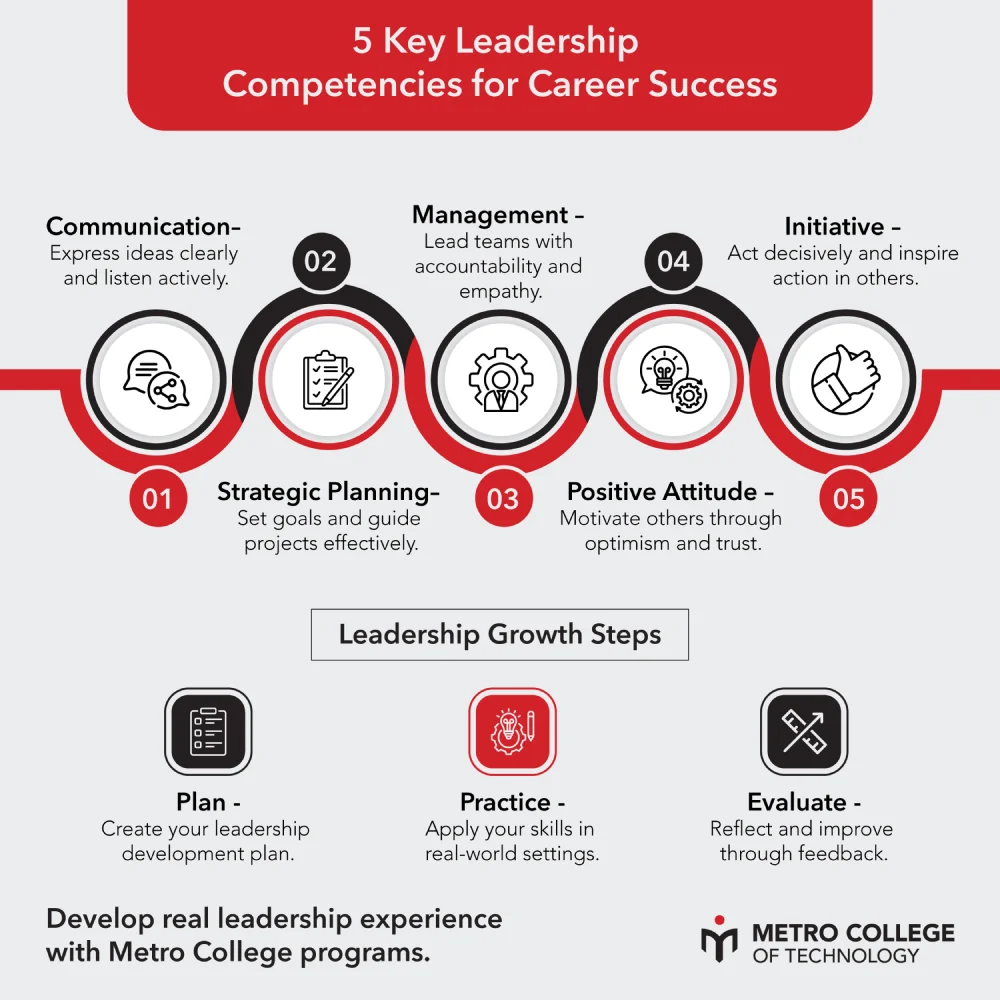Strong leadership is not limited to job titles or management roles, it’s a professional mindset that shapes how you think, plan, and inspire others. Understanding the key leadership competencies gives you the ability to communicate clearly, build trust, and guide projects toward success. Whether you are a student, new graduate, or experienced employee, developing leadership skills early can significantly improve your career trajectory.
Key Takeaways:
- Leadership skills are critical for teamwork, career growth, and professional credibility.
- The key leadership competencies, communication, planning, management, initiative, and attitude, can be developed through consistent practice and feedback.
- A personal leadership skills development plan helps you evaluate strengths, identify improvement areas, and apply real-world experience to grow your influence.
Why Leadership Matters in Every Profession
Leadership isn’t just for executives. Every industry values people who take initiative, communicate effectively, and support others. Whether you’re managing a project, mentoring a colleague, or contributing ideas in meetings, leadership behavior shows that you’re dependable and invested in results.
In today’s collaborative workplaces, people leadership plays a major role in productivity and morale. Teams perform better when individuals take responsibility for guiding progress and motivating others. The more you practice these habits, the more you position yourself as someone capable of managing change and leading through uncertainty.
You can strengthen these abilities through programs such as Metro College’s Work Experience Program Toronto, which helps students apply classroom learning to practical, leadership-based situations.
Understanding the Key Leadership Competencies
The key leadership competencies are the qualities and behaviors that define effective leaders. They combine technical ability with emotional intelligence to influence, guide, and support others. These competencies include communication, planning, management, initiative, and maintaining a positive attitude. Each one contributes to building stronger teams and achieving sustainable success.

Communication: The Foundation of Leadership
Every great leader is a clear communicator. The ability to express expectations, share progress, and provide constructive feedback builds transparency within teams. Communication involves more than speaking, it includes active listening, empathy, and adapting your message for different audiences.
Leaders who master communication motivate others through clarity and consistency. They know how to address challenges, recognize effort, and create open dialogue. If you’re seeking to develop leadership skills, improving how you communicate is one of the most effective places to start.
Strategic Planning: Turning Vision into Action
Strategic planning is where leadership turns ideas into results. It’s about understanding team strengths, setting achievable goals, and identifying potential risks before they become obstacles. Leaders who plan strategically think ahead and allocate resources wisely.
When building your leadership skills development plan, include strategic planning as a core focus. This competency demonstrates your ability to connect daily activities to long-term goals, an ability employers consistently associate with strong leadership.
Management: Balancing Accountability and Empathy
Management as a leadership skill goes beyond delegation, it’s about accountability. True leaders take responsibility for both success and failure. They protect their teams, resolve conflicts with tact, and learn from mistakes to create better systems moving forward.
Balancing performance management with empathy is one of the most challenging yet rewarding parts of leadership. Effective managers recognize that people perform best in an environment where feedback, guidance, and encouragement coexist. You can gain hands-on practice in these areas through Metro College’s Employment Service Toronto, which helps learners understand leadership in workplace settings.
Positive Attitude: Leading Through Optimism and Resilience
A leader’s attitude sets the tone for their entire team. Positivity inspires motivation, even when challenges arise. Maintaining an optimistic mindset doesn’t mean ignoring problems, it means approaching them with calm, solution-oriented thinking.
Positive leaders create environments where colleagues feel valued, supported, and encouraged to keep improving. They use gratitude, humor, and recognition to sustain morale. This mindset is a core element of how to develop leadership skills that last throughout a career.
Initiative: Acting with Confidence and Courage
Taking initiative is what separates leaders from followers. It means identifying opportunities for improvement, offering new ideas, and taking responsibility before being asked. Initiative demonstrates confidence and reliability, traits that employers actively seek.
When developing your leadership skills development plan, include goals related to initiative. For example: volunteer to lead a small project, contribute to problem-solving sessions, or research solutions independently. Metro College’s Research Projects Toronto program is an ideal platform to apply these habits through structured, collaborative projects.
Giving Credit: Building Loyalty Through Recognition
True leadership recognizes the value of others. Giving credit where it’s due builds trust and loyalty among peers. When leaders acknowledge effort, employees feel seen and motivated to perform better.
Recognition can be simple, thanking a colleague publicly or highlighting team achievements during meetings. Small actions like these demonstrate humility and fairness, both essential to people leadership.

Strengthen your leadership skills through real-world experience.
Metro College’s Work Experience Program Toronto gives you opportunities to lead projects, collaborate, and grow confidence in your professional role.
Explore Work Experience OpportunitiesEvaluating Leadership Skills and Measuring Growth
No development process is complete without reflection. An evaluation of leadership skills helps you identify strengths, challenges, and opportunities for growth. Self-assessment tools, feedback from peers, and mentor guidance can provide valuable insights into your progress.
Ask yourself:
- Do I communicate clearly and consistently?
- Am I approachable when others need help?
- Do I set realistic goals and follow through?
- How do I respond to setbacks or criticism?
This honest reflection helps you build a clearer picture of your leadership potential. For professional guidance, Metro College’s Job Search Assistance Toronto offers support in developing leadership strategies that align with career goals.
Building a Leadership Skills Development Plan
A well-structured leadership skills development plan helps transform theory into action. To create one, define clear objectives, set measurable milestones, and identify learning resources. Consider the following steps:
- Set specific goals: Identify the competencies you want to develop first.
- Seek feedback: Ask mentors or supervisors for guidance on improvement areas.
- Apply what you learn: Take part in projects that challenge you to use new skills.
- Review progress regularly: Adjust goals based on achievements and feedback.
A plan like this builds momentum and accountability, helping you grow at every stage of your career.
How to Develop Leadership Skills Through Experience
Learning leadership from theory is helpful, but applying it in real settings accelerates growth. Volunteer for challenging tasks, mentor others, and participate in group initiatives that stretch your abilities. Leadership grows with repetition and reflection.
Practical experience, combined with feedback from peers and instructors, allows you to refine how you make decisions and influence others. Metro College’s programs, such as Work Experience Program Toronto, offer structured environments where students can lead, collaborate, and improve.
Continuous Learning on Your Current Role
Leadership development doesn’t end with a single course or project. Great leaders keep learning, adapting, and evolving with their industries. Continuous learning can take many forms: workshops, mentorship programs, or advanced education.
Metro College supports ongoing professional growth through programs that combine theoretical and applied learning, helping students build both technical ability and leadership confidence that lasts a lifetime.
Growing Leadership: Applying Key Leadership Competencies
Mastering the key leadership competencies gives you a professional advantage in any environment. Communication, planning, management, positivity, and initiative form the core of effective leadership, while evaluation and continuous improvement sustain long-term growth.
Developing leadership skills is an ongoing process of self-awareness and application. By learning from experience, seeking feedback, and investing in your personal development, you create the foundation for strong, confident leadership, skills that will serve you throughout your career.
Programs such as Metro College’s Work Experience Program Toronto and Employment Service Toronto provide hands-on opportunities to apply these skills, preparing you to lead in any professional setting.

Get expert help building your leadership development plan.
Metro College’s Employment Service Toronto helps you identify, evaluate, and improve your leadership competencies through coaching and practice.
Start Your Leadership Plan